6 Common PPC Mistakes That Waste Your Ad Budget
Search intent is everything when investing in PPC ads. If you don’t nail your search intent, you’ll receive many irrelevant clicks. This will lead to high investment but low conversion rates, AKA wasted ad spend—and too many companies do this.
They either target a keyword that is too broad or link their ad to a generic landing page without specific reference to the ad a user clicked.
There are many loopholes like this, and to increase your reach and returns from PPC ads, you need to ensure that:
- Your ads are appearing for the right keywords.
- Your ad copy is informational and persuasive enough.
- Your landing page aligns with what your ads promise.
In this article, I’ll discuss six common PPC mistakes I’ve seen brands make that could potentially lead to waste in ad spend and reduce conversion rate.
6 Common PPC Mistakes That’s Wasting Your Ad Budget
1. Your Account is Not Properly Structured
PPC ads should be intentional. If you’re targeting any keyword, they should be the exact terms your potential users use while searching for a solution like yours.
In other words, their search queries should match the ad you’re showing up for, but most importantly, these ads should match what your landing page offers.
An example is the Caretta Workspace ad for the query “work desk for sale in Houston.”

The ad takes users to a relevant landing page that showcases the different kinds of work desks they can buy. Just as the ad promised:
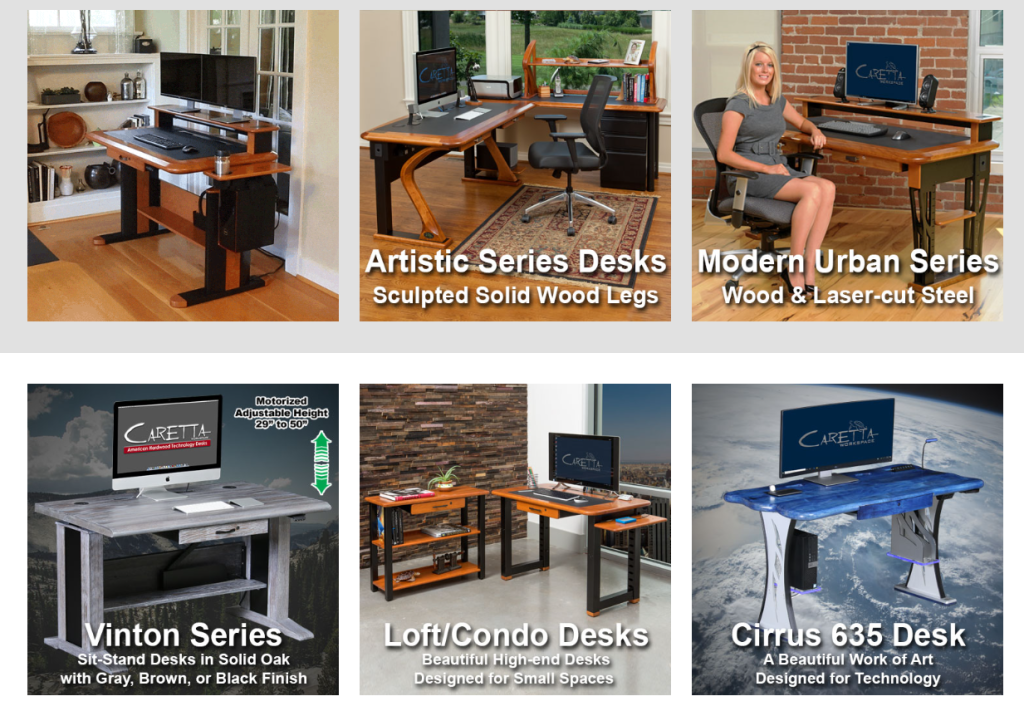
If your landing page is not in sync with the ad you are pushing out, potential customers will visit your site but not follow through on your CTA because it’s not relevant to what they came for.
In another scenario, you are a company promoting a fitness app. You run an ad that appears for “Get Fit in 30 days.” This will attract users who need short-term fitness programs because they want to get fit fast.
However, when they click your ad, they find out your landing page promotes a 12-month subscription plan— surprise, you don’t even offer a 30-day fitness program.
Users will be disappointed, and they will leave. Since you’re paying for every click, you just lost money (and there’s more to lose).
Now, you may not have intentionally “catfish-ed” your potential customers; there are several factors that could be causing this misalignment, including:
- You’re Using Broad Match Keywords
Broad match keywords show your ads to a wide range of related searches. If you chose a broad keyword for your ad, your ads could appear for synonyms of the keyword, singular and plural forms, or even misspellings.
For instance, if your broad match keyword is “running shoes,” you could appear for searches like:
- “Athletic shoes for runners”
- “Best sneakers for jogging”
- “Types of running footwear.”
Now, these aren’t bad—they push your ads to a wider audience. The downside is that there could be a misalignment between what your ad says you are selling and what you actually sell.
- You’re Not Adding Negative Keywords
Negative keywords are those you do not want to appear for.
If you sell “men’s office shoes,” your ad should not appear for “women’s office shoes” searches. However, there’s a possibility it might, because “office shoes” appears in both search terms, and users searching for ”office shoes” could still find your ad, regardless of whether they are looking for men’s or women’s shoes.
Add negative keywords so that Google knows which keywords not to target. I’ll cover more on this later.
- You’re Letting Google Automate Everything
Automation is easier when you do not want to guesswork keywords. You can leave it to Google to use features like Dynamic Search Ads to crawl and analyze pages on your website.
Google then creates broad keywords that it believes are relevant to your search intent and pushes your ads toward those keywords.
The problem with automation is that Google is not always right about which keywords are relevant to you. This is why the fitness company was showing ads for a 30-day program it doesn’t offer.
The best way to correct this is to do some of the work yourself.
So, don’t automate everything.
Rather than broad-match keywords, use phrases or exact keywords that push your ads out for the keywords you want to appear for.
You should also pin important keywords to number one so Google automation knows they’re important and doesn’t push them to the back. Here’s an example:

- Writing Poor Copy And Poor Design
Your ad copy is the first touch point with potential customers after they leave the search results. If it is unclear, overly complicated, or doesn’t speak to the user’s search intent, it will not engage them.
This is why you may get fewer clicks or clicks from uninterested users who quickly bounce.
That’s not the only important thing.
Even if your ad copy resonates with users, a poorly designed landing page can ruin the interaction. Visitors will leave almost instantly if your landing page feels cluttered or visually unappealing.
Design influences trust, and if your website looks wonky, people will question the legitimacy of your product or service.

What to do:
Ensure you have a great website design, an effective navigation bar, and clickable CTA buttons. Also, ensure the users see a clear path to go from A → B → C without friction.
For example, users that land on the website below for the keyword “best gym shoes” know how to go from A → B → C. They see the review on each shoe and can click to Amazon or Nike to buy any of the shoe they want.
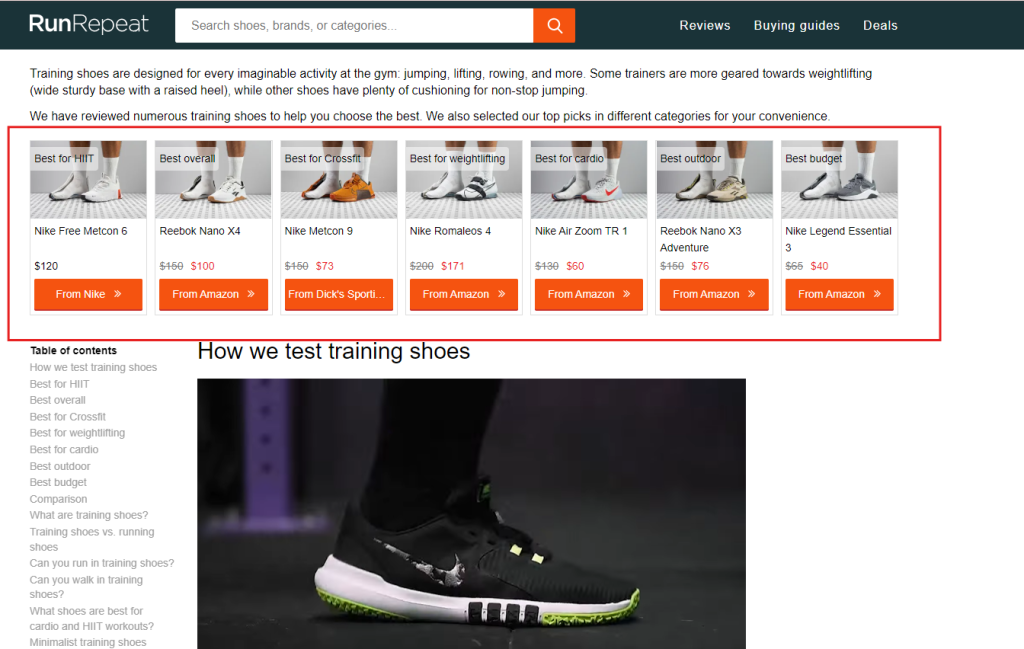
Read more on how to design a strong website design here.
- You’re Not Optimizing Your Landing Page to Convert
You need more than attractive visuals to optimize your landing page.
Talia Wolf, founder of GetUpLift and landing page optimization expert, says, “Your landing page shouldn’t only show your products, it should show potential customers what using your product will look like for them and how it’ll solve their problems.”
The key to a great landing page is empathy— knowing what your prospect is feeling right now and what brought them to your website in the first place.
- What frustrations do they have?
- What are their needs?
- Why are they on your page?
When you can answer these questions, everything on the page— your visuals, headlines, copy, and even social proof— should speak directly to those emotions and concerns.
Here’s an example from Rylee + Cru.
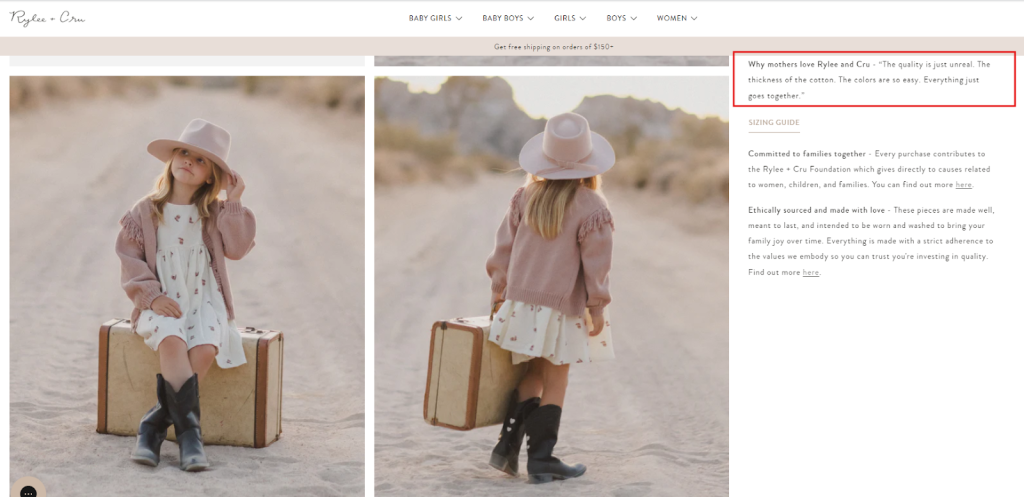
The captioned part reads:
“Why mothers love Rylee and Cru – ‘The quality is just unreal. The thickness of the cotton. The colors are so easy. Everything just goes together.’”
Mothers who see this will consider their objections resolved already.
Social proof works, but it goes beyond adding logos of companies you’ve worked with (especially in B2B). What you should do is write user reviews to show how exactly your product or service helped real people. It’s an easy way to tackle any objection from potential buyers who don’t know if your solution will be relevant for their specific use case (or meet a specific need).
To improve your chances of success, interview your loyal customers or ask for reviews after any purchase. People who had doubts but found that the product exceeded their expectations will have good things to say about it.
Social proof only works when it addresses users’ hesitation, and that’s why it’s an essential part of your copy and design.
2. You’re Focusing on High Volume Keywords
Focusing solely on high-volume keywords is a common mistake in PPC ads.
High-volume keywords have many searches, and while they may bring in many visitors, they usually have low intent.
For example, a keyword like “best running shoes” has a lot of search volume, but doesn’t communicate high-intent as “buy Nike running shoes online.” The second keyword shows clear purchasing intent and is more likely to convert.
Apart from the high bounce rate, high-volume keywords are expensive for PPC ads.
With PPC, you pay for every click and visit to your site, and if these users leave right after clicking, you’re spending a lot of money with no ROI to show for it.
For context, the cost-per-click (CPC) for “mattress for sale” is $3.69. If you have to pay $3.69 every time a user doesn’t buy something before they leave, you’d be wasting your ad budget.
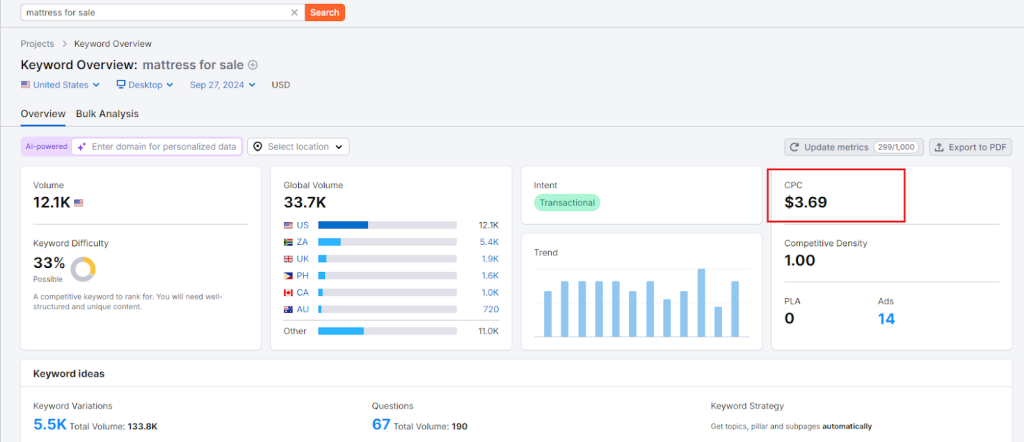
The key is to shift your focus towards long-tail, high-intent keywords. Though they have lower search volumes, long-tail keywords are more specific and more likely to drive conversions.
Instead of targeting “mattress for sale,” you could focus on “best mattress for side sleepers with shoulder and hip pain”.

It has higher CPC, but there are 1.6k search volume for it every month. Most of the clicks on your ad will be from users who are side sleepers are ready to buy.
You can use Google’s Search Terms Report to know the exact terms people are searching for before they click on your ads.
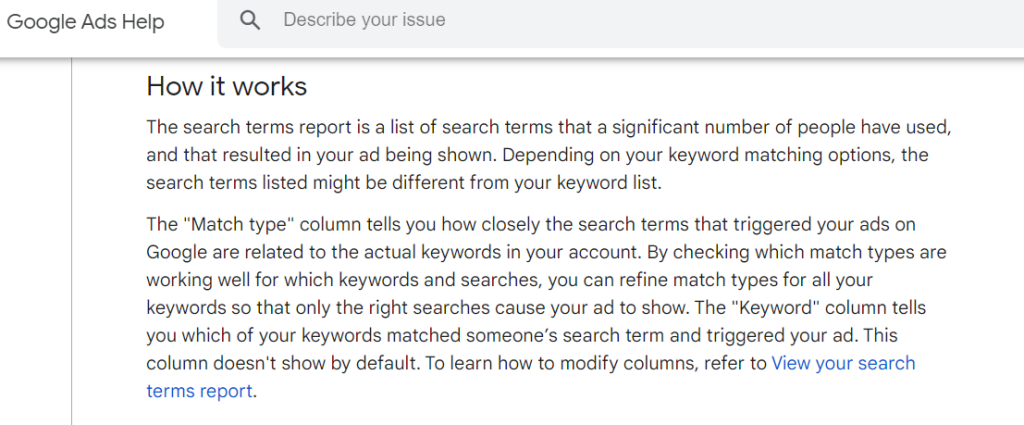
This report will show whether the traffic you are getting is users looking for information or if they are ready to make a purchase.
Another factor you should consider is the match type of your keywords. Even the best keywords won’t matter if your match type is set incorrectly.
If you use a broad match for a high-volume keyword, you risk showing your ad to people searching for loosely related terms that have nothing to do with your product—remember the fitness company I mentioned earlier?
This mismatch will lead to increased ad spend, irrelevant clicks, and low conversion rates.
You should use phrase match or exact match to ensure your ads show only when people search for terms closely related to your product or service, which brings us to the next point.
3. You’re Not Using Negative Keywords
PPC ads have three types of keyword categories: broad match, phrase match, and exact match.

But there are also negative keywords.
Each keyword type controls how your ads are triggered when people search for different terms.
- Broad match: This match type shows your ad for searches with variations (synonyms and related searches). Broad match gives your ads the widest possible reach but could also show your ads for irrelevant searches.
- Phrase match: This is a bit more refined. Your ad will only appear when a user searches for a phrase that includes your keyword in the exact order but can have additional words before or after. For example, if your keyword is “running shoes,” your ad may appear for “Which type of shoes are the best running shoes for kids?” or “Which store nearby can I get the best running shoes for women.” It won’t show for unrelated terms.
- Exact match: Here, you’re targeting specific keywords. Your ad will only show when someone types the exact keyword you’re bidding on or close variations of it. Exact matches have more control, which means your ads are seen only by users searching for the exact terms you want to appear for.
Negative keywords are the keywords you do not want your ads to appear for.
If you sell luxury watches but don’t want to attract bargain hunters, you could add keywords like “cheap” or “discount” as negative keywords.
This way, your ads won’t pop up when a user searches for cheap watches or discount luxury watches, and you can avoid paying for clicks from users who are not likely to convert.
One way to know if your ad is appearing for keywords that should be negative is
- If certain search terms drive clicks but do not generate conversions.
- If you notice that a search term is attracting the wrong audience.
Add these terms to your negative keywords list.
4. You’re Not Adding Ad Extensions
Ad extensions in PPC ads are additional elements that provide more information about your business besides the main ad copy. It could be
- links to pages on your website (site link extensions)
- your phone number (call extensions)
- your business address (address extensions)
- or special promotions (promotion extensions)
Ad extensions give your ads more context, which can improve how users interact with them.
Here’s what I mean:
Adding a phone number or location to your ads makes it easier for people to contact or visit your business directly. This increases the chances of them reaching out or taking action.
Here are some examples from SEMrush:
Call ad extension from ProperCloths:

Location extension from a Ford Dealership in New Jersey:

Ad extensions also give (potential) customers a clearer picture of what you offer before they click.
If users see links to specific product pages or a promotion at your store, they may be more inclined to click on your ad because they know what to expect.

Another reason you should consider ad extensions is that they take up more space in the search results. In the process, they push your competitors down the page, and users spend more time on your ad. This increases your site’s visibility.
You can add ad extensions on Google Ads while creating or editing your campaign. Choose the type of extensions and customize each to fit your campaign’s goals.
5. Too Many Keywords per Ad Group
Having too many keywords in an ad group can confuse your campaigns. Google recommends having six keywords per ad group, but even these keywords are broad matches that may throw your ads off its targets:

If you sell iced coffee, but your ad appears for a user looking to buy soda, they’ll click and bounce because they are not looking to buy iced coffee.
Instead, use exact and phrase match keywords to show your ads to the right audience. You can use long-tail keywords to target users close to you, like you would in local SEO.
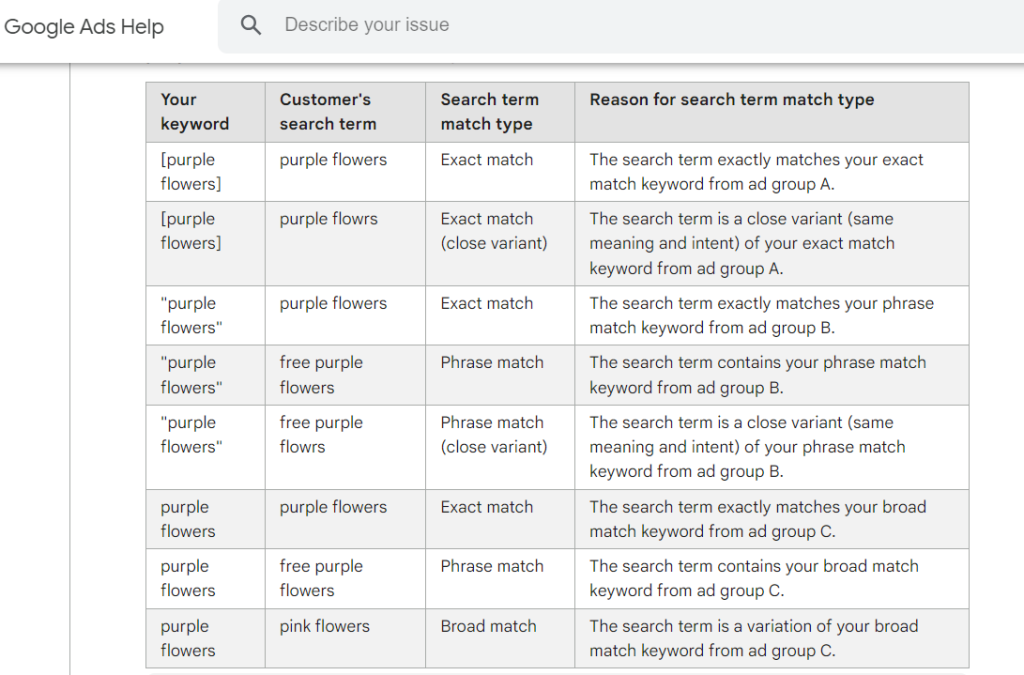
For instance, your keywords for iced coffee can be:
- Phrase match: “iced coffee delivery”
Exact match: [iced coffee delivery]
- Phrase match: “best iced coffee shop”
Exact match: [best iced coffee shop]
- Phrase match: “buy iced coffee online”
Exact match: [buy iced coffee online]
Phrase matches will trigger searches like:
- “iced coffee delivery near me”
- “find the best iced coffee shop”
- “buy iced coffee online fast”
And exact matches will trigger accurate searches like:
- “iced coffee delivery”
- “best iced coffee shop”
- “buy iced coffee online.”
These keywords have high-buying intent, and users who search for them will most likely click and buy.
6. You’re Not Using a Remarketing Strategy
Remarketing in PPC (Pay-Per-Click) advertising lets you re-engage users who have previously interacted with your website. It targets users who have already shown interest in your brand. They may have browsed your product or visited your landing page without making a purchase.
You can remarket your products to bring them back. Seeing your brand the second time is more likely to convert them than it would a first-time visitor.
Most users don’t convert on their first visit. The average conversion rate for first-timers in e-commerce is about 2.5 to 3%.
In contrast, retargeting ads are 76% more likely to get clicks than display ads, and people are 70% more likely to convert when they are retargeted.
There are several categories of visitors you can remarket to:
- Users who visited your website
Retarget users who have visited your website pages in the past but didn’t complete your CTA. You can create custom ads for different segments. For example, you can target;
- Users who viewed a product page but didn’t buy.
- Users who browsed specific product categories but did not convert.
- Users who abandoned their cart without completing their purchase
Retarget these visitors with “suggested for you” ads as they scroll through websites. See this example from Nike, based on a user’s recent search for running shoes.

I also found this tactic while browsing Riley + Cru’s product pages. It encourages visitors to stay in touch when they’ve spent a couple of seconds on the page.
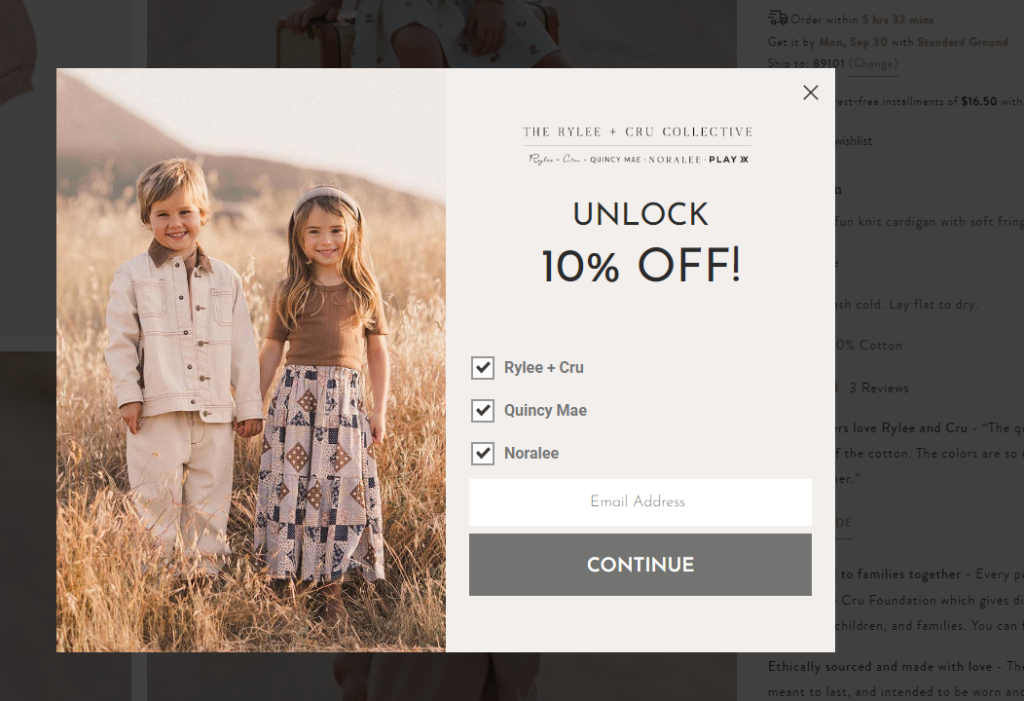
- Remarket to users who purchased your product in the past
Re-engage past customers with ads that promote complementary or new products. You can also offer them exclusive deals to encourage repeat purchases.
Spotify did this to encourage its traditional users to upgrade to its premium version, with a 3 months free trial that’s bound to convince anyone.

- Remarket to users who engaged with your ads
Target users who have clicked on your ads in the past but left shortly after. Remarketing campaigns can nudge them to follow up on their interests and bring them back.
See this remarketing ad from Casetify that follows up on the user’s interests.

Conclusion
PPC ads are expensive. This is why you should eliminate common mistakes that could affect your success and ROAS. However, just like in organic SEO, your keyword approach is important when setting up your ad account. The keywords you choose to appear for should match with users’ queries so the traffic converts to paying customers, especially since you’re paying for every click and visit.
We know these things at HigherVisibility. Rather than try to run your PPC ads unprepared, we have a non-automated and intentional approach to help manage your budget to improve returns on every dollar spent. If you are interested in working with us, schedule a no-commitment call with our team of professionals for a better PPC strategy.
